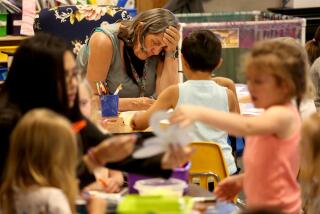Stories of School Dropouts
- Share via
As a teacher at Taft High School, I was naturally attracted to “The Other Class of ‘87” (View, June 18). The article consisted only of the autobiographies of school dropouts, with no opportunity for the school district to provide a different perspective. Two of the autobiographies were of particular interest to me, those of Dave Dockter and Juan Ramirez.
After the spring semester started, Taft High created a special auxiliary class to assist students in fulfilling the state graduation requirements in government and economics. I volunteered to teach this class. On my computerized roster were the names of Dave Dockter and Juan Ramirez. Ramirez showed up once and never returned; Dockter never showed up at all. Regardless of what they had to say about the school system and how it failed to meet their needs, my classroom door was open and I was ready to help them. All they had to do was offer something of themselves. They chose not to do so.
I wish these young people all the best for their future, but their decision was made on their own, and school and its complexities seem only to have been a part of their problems. Schools today are expected to deal with drug problems, parental neglect, anti-intellectual apathy and transients, as well as provide a learning environment for everything from algebra to auto shop. In return the schools are vandalized, criticized and under-funded. Education is not only for the teachers and the students. It is a commitment that requires everyone’s participation and support--parents, businesses, government leaders who don’t use it for a political football--because, without the support of society, young people such as those in your article will continue to tell dismal stories of failure and disappointment at a point in their lives when they should be full of promise and expectation.
ABRAHAM HOFFMAN
Woodland Hills
Hoffman teaches social studies at Taft High School.
More to Read
Sign up for Essential California
The most important California stories and recommendations in your inbox every morning.
You may occasionally receive promotional content from the Los Angeles Times.













